- Getting around Lijiang. Dont stay in the Old Towns more than 2 days, there is nothing to do. KRISS Oct 9, 2013 05:46
- 2013 Beijing Temple Fair BENNYLAU Feb 26, 2013 03:29
- Malaysian traveling from KUL - LAX vis Shanghai PVG ZATI_DY Jan 3, 2013 20:15
Lights of Lijiang
- Views: 4798
- |Vote: 0 0
- |Add to Favorites
- |Recommend to Friends
Torch Festival
Lijiang holds a special place in the heart many people – not least in mine. I was looking forward to a more leisurely second visit. The first time I had seen so very little in the one day we spent here during our five day package tour of Yunnan. This time we stepped off the bus shortly before dark after a wonderfully long bus trip through the mountains from Panzhihua. A minor altercation with a car on a hairpin bend not far from town kept us waiting almost an hour for the police to arrive to sort out each driver’s responsibility but it did not dampen our spirits.
As we emerged from the station we were immediately offered rooms in a family guesthouse. On my first visit I had stayed in a hotel in the new part of the city much to my disappointment so this time we were looking for something a little more authentic. We bundled into a taxi and off we went to have a look. A couple of blocks from the station the streets began to narrow. We stopped and followed our host a short distance down the alley and into a courtyard full of shrubs and flowers in a riot of colour. What a welcome. It was small, quiet, clean and friendly. It would do.
Our family were ethnic Naxi, a husband and wife and her mother, a diminutive woman in her seventies, slightly stooped but full of energy and curiosity. We quickly settled into our rooms and after a light supper headed off to explore in what remained of the evening light. Since we were on the outskirts of the old town – a ten minute walk from the central square – our elderly host insisted on escorting us the first time. She was careful to point out the street names and land marks – the tree on the corner of the alley, the bridge over the canal – so that we would have no trouble finding our way back later in the dark.
Another surprise was that we had arrived in Lijiang during the celebration of the ‘Torch Festival’ which has its origins in the Nanzhoa Kingdom, when the wife of a man burned to death by the king eluded his amorous approaches by leaping into the fire. Outside each home along the narrow stone flagged streets were two to three meter high torches made of bamboo and wood scraps decorated with flowers and grass waiting for darkness to fall. Walking back after dark these stood, flames dancing, in our path, sparks and embers flying in the cool evening breeze. Outside the gate of our guesthouse the family torch burned and neighbours and guests had gathered around a smoking barbeque. We joined them. Positioning our low stools to avoid the smoke was difficult but we were soon sharing the hot potato and lotus roots skewered on sticks.
Exposed by Rock
Lijiang, once known only to anthropologists and naturalists like Joseph Rock and the hardiest of backpackers is fast succumbing to an influx of Han entrepreneurs keen to make a dollar and Han tourists keen to spend it. Old Lijiang is now a very popular tourist destination. As we walked into town the next morning we met a group of university students from Guangdong and they invited us to share breakfast with them. They ordered a special breakfast dish called Naxi baba – a small sweet flaky pancake – which was a delicious introduction to the local food.
In 1996 Lijiang was rocked by huge earthquake which levelled the new town but the traditional Naxi buildings of Old Lijiang suffered little damage. Taking note of this the government has encouraged building in the more traditional style replacing concrete with cobblestones and wood. The main entrance to the old town is by way of the Yulong Bridge beside the huge water wheel on the Yu River which runs through the west of the old town. The Old Market Square is roughly in the centre of the town beneath Shizi Shan (Lion Hill) and Looking at the Past Pavilion from where you’ll get a good view of the town and the distant snow capped mountains.
From the square a maze of small cobbled streets twist and turns their way through Old Lijiang and it’s easy to get a little lost. The cobble pattern of each street does however indicate its importance making it possible to follow the main thoroughfare by the stones laid three wide lengthwise down its entire length. A secondary street has two parallel stones and a minor street only a single lengthwise slab. An exploration of these, especially the quieter streets away from the hustle of the tourists will reward you with a lot of interesting sights – locals in traditional dress, quiet homes and guesthouses, shops, wells, parks, and rooftop cafes with commanding views over the dark tiled rooftops of the entire old town. .Many residents still wash both food and clothing in the canals that flow through town and dress much as they have for decades in their simple traditional clothing, some of which can be purchased along with traditional silver jewellery and other handcrafts. Guests may don a fur cap and period costume to ride a horse through the narrow streets of town. It’s not hard to imagine caravans of traders or soldiers passing through on horseback.
The restored Mu Family Mansion, formerly the home of a Naxi chieftain is worth a look. It was rebuilt after the earthquake and backs onto Lion Hill. Another Naxi family home open as a museum for tourists is that of Xuan Ke, a scholar who spent 20 years in labour camps during the Cultural Revolution and a friend of Joseph Rock’s, the Austrian who lived more than 20 years in Lijiang shining a light on south west China through pictorials in the National Geographic. Heilongtan Gongyuan or Black Dragon Pool Park is home to the Dongba Research Institute, the Ming dynasty’s Five Phoenix Hall and the Museum of Naxi Dongba Culture. The park is in the north of the town and is the best place on a clear day to get a good shot of Yulong Xueshan (Jade Dragon Snow Mountain) especially at sunrise.
Red Lanterns
Old Lijiang is busiest during the afternoons and evenings when swarms of tourists arrive for the first time or return from a day trip to surrounding scenic spots. If you have the luxury of several days you can avoid most of these crushing crowds. Staying nearer the outskirts of the old town is another good way to avoid them and the resultant noise. Imagine my surprise just on dusk on our second evening in town when a young Chinese lass rushed up to me, calling my name, arms open wide, to embrace me in the street. Being a foreigner of course I was much easier to spot but it took me a few seconds and a name to recognise this colleague of mine. We have since become great friends and often travel together.
Outdoor dining on good food in the mild night air and the glow of red lanterns, watching candles float silently along the canals, is a great time to reflect on your travels and experiences in this great land of contrasts. Restaurants and cafes on the banks of the main canal at the north end of town offer the best Naxi snack food both day and night. Being on the backpackers route Lijiang has a great choice of small cafes offering good western style and local food, especially breakfasts which is a pleasant treat after weeks without the familiar.
Lijiang is often used as a staging point for a visit to the famous Tiger Leaping Gorge on the Yangtze River to the north. We were not going to tackle the gorge but we did want to see the river at another famous spot called the First Bend in the River where it turns east to begin its final journey to the sea at Shanghai. We caught a local bus to Shigu the small village on the bend which takes its name, Stone Drum, from a marble plaque shaped like a drum commemorating the Naxi victory over an invading Tibetan army in the 16th century.
Another feature of this small impoverished village is the Iron Rainbow Bridge. It’s a pretty, sagging suspension bridge across the creek on the edge of town and gets its name from the large iron links and its rainbow shaped reflection in the waters of the creek. Mao’s Red Army also crossed the river here in 1936 on the Long March north to Yan’an. A memorial overlooks the village and the river bend. The river, known here as the Jinsha or Golden Sands is still awesome in size and the flow of muddy water rips along the bank around the bend. Tourist boats are moored along the bank but may only operate for large tour groups. A few restaurants line the road in the village where you can get a good feed or browse the small handcraft stalls while waiting for the bus to back to Lijiang. My young colleague and her friends arrived just as we were finishing our lunch.
West and north of Lijiang tower the year round snow capped mountains which offer good hiking, horse riding and even skiing. All are easily accessible by local tours or hire your own car and driver – we even met some young adventurers who cycled out to Jade Dragon Snow Mountain an impressive peak of 5500m where you can glimpse the foot of a glacier.
The 3300m Yunshanping offers great summer hiking and winter skiing. Yak Meadow or Maoniuping at 3500m and about 60kms from Lijiang also offers good hiking and horse riding. All these mountains have cable cars to the peaks which are often socked in with cloud and fog. Log cabins are the typical architectural style of the small villages of Heishui and Baishui and homesteads beside the roads on the way out to the Yak Meadows. You will see yaks here but you’ll be expected to pay for the photos you take so be discrete or better still dress up in Tibetan clothes and take a ride. Of course none of these are good options unless the weather is clear and try to avoid peak season. The Yak meadow was fogged in during our visit and we spent three hours waiting in the queue for the cable car only to see nothing when we arrived at the top. Despite being a long way to go for a Tibetan barbeque we did warm up and enjoyed the food prepared by our singing cook.
The Naxi, like the neighbouring Mosu is traditionally a matriarchal society. All property is inherited by women, all decisions are made by the women, and all children are the responsibility of the women. Men spend the nights with their lovers and return home to their mother’s homes to live and work. The Naxi have a 1000 year old written language of pictographs which is still in use to day and used in many souvenir items. They also practice Dongba, a modified version of the ancient form of Tibetan religion known as Bon.
Behind our bedroom door was a list of rules for guests that read something like this –
• do not over stress the electrical outlets
• no prostitution
• no drugs
• no fighting, take it to the street
• keep clean, pick up your mess
• no fireworks or other explosives
• in case of fire there is no emergency switch or extinguisher so select the staff or police
• be extra careful of fire you are surrounded by wood
• Any failure to follow these rules will result in something very unpleasant.
These are pertinent reminders in an ancient city of timber, tiles, and stone to be careful at all times but especially so during the annual ‘Torch Festival’. Whether shops, restaurants or guesthouses the traditional wooden buildings of Old Lijiang ooze with character and warmth beside the clear cool waters of the canals which once supplied the town’s drinking water. Window boxes and planters overflow with colourful peonies and begonias, open doors warmly invite guests in, classic bridges of stone or simple timber planks span canals and red lanterns light the streets with a subtle rosy glow when darkness closes in. The mountains are majestic, the sky is clear, the streets are clean and the residents are real.
Lijiang is a place to linger, to loose yourself in time. It’s easy to understand why Joseph Rock was fascinated with the people and so reluctant to leave. I was too.



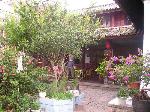
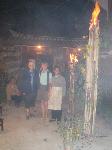
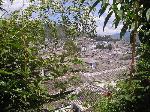
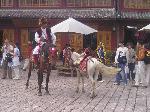
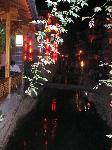
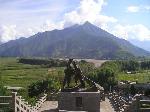
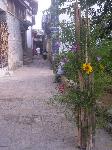
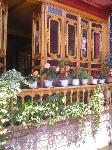
 Copyright © 1998-2026 All rights reserved.
Copyright © 1998-2026 All rights reserved.
1.
Mar 31, 2006 15:15 Reply
TEDVEENBOER said:
Exellent story about Lijiang.Exactely the events I made in Oct 2005.Same experience.So bravo for your story!!